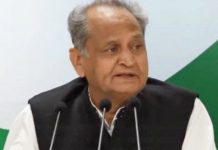
There are none of those full-throated cries against the human tragedies taking place. We need to cry out, now and immediately: Halt this war…please halt this war!
Seeing those shots of Russia’s military might unleashed on Ukraine and its people, I feel we Indians, as a people, are not reacting enough to those deadly disasters taking place. Mind you, though a large percentage amongst us are against Russia’s war-cum-invasion of Ukraine but there are none of those full-throated cries against the human tragedies taking place! We need to cry out, now and immediately: Halt this war…please halt this war!
As a collective lot we aren’t reacting enough to the human disasters unfolding each single day. It wouldn’t be amiss to say that by the time some sort of a truce or ceasefire could get announced thousands in Ukraine would have perished in one way or the other.
We were perhaps much more vocal and strong-voiced in the 90s …Before America’s aggression into Iraq, the Iraqi Embassy in India, situated in New Delhi’s posh Jor Bagh, was ‘alive’, with over 40 Iraqi diplomats at work. As the ‘mother of all wars’ peaked in the 90s, I had visited the Iraqi embassy on several occasions to interview the then Iraqi envoy to India. I had also met Sikh and Hindu and Muslim families gathered there in large numbers, chanting slogans in support of Saddam Husain, for taking on the super power of the world — America!
I saw many, many well-to-do Indian families carrying rations and medicines, pleading with the Iraqi diplomats that those huge cartons/ containers be sent to the Iraqi soldiers fighting the American forces. It was such a forceful-impactful- touching-sensitive sight of that great human bonding that it gets difficult to describe…After all, it was humans here, standing up for humans out there— across seas and mountains and desert stretches, thousands of miles away.
Why no such human bonding today? Is this because we have become exhausted and fatigued and weak, fighting our own survival battles? Or is it because there’s so much of hopelessness spreading out, with that there’s little hope left?
The fact is that many amongst us are sitting baffled: Where are the United Nations protecting powers! Where are the world’s political who’s who, who never miss an opportunity to give speech after speech on peace! Where are all those peace-brokers who are forever to be seen on the international summits and circuit, talking of the welfare schemes and protective formats! Where are those statesmen who can carry the grit to take on arms lobbies and dealers! Where are all those world leaders who are seeing the plight of the ever increasing number of the refugees – children, women, men running away from their homelands towards the unknown terrains!
Non-issues being made into issues!
Ground realities don’t look good here too, in our country.We have begun tearing each other’s flesh on any alibi, with the communal virus unleashed in our midst, hovering around in the background or foreground!
With rising prices of the essential commodities and very little on the platter, we are being distracted by the spread of the communal hatred. Uncontrolled, made to spread out. Non- issues being made into issues!
The manner in which Haldiram’s store manager was very recently verbally assaulted by one of godi media’s channel women reporters, on the alibi that the packing-cover of the ‘Falahari’ packet had ‘Urdu’ text on it! That TV reporter spoke in that typical communal aggressive way. And she was so very busy pursuing the communal agenda, that she didn’t quite realize that those product description words were in Arabic, as Haldiram’s snacks are popular in the Arab and Middle East countries. Thankfully, till date there isn’t any discrimination in those countries. Definitely not along the lines of whether the manufacturer of eatables is from a this or that religion, caste or country.
In fact, this incident reminds me of what Jesuit priest, Father Cedric Prakash had once told me in the context of the communal virus made to spread out in Gujarat, resulting in the 2002 pogrom. He had told me that in Gujarat the communal poisoning had been on, along the set definite agenda. He had even narrated an incident to relay the petty narrow-mindedness along the communal strain: “One day an influential citizen of Ahmedabad called me over to his home for breakfast and told me I should keep away from the Muslim community. He kept saying, ‘Muslims ought to be settled! We are going to teach these Muslims a big lesson…you boycott them’. Mind you, whilst he was saying all this, he offered me seedless dates with ‘Made in Iran’ label printed on the packet!”
And till about recent years there wasn’t ever any controversy about halaal or the jhatka meat but now there’s come up petty politics in this too! With many from the ignorant communal lot, joining the bandwagon without even being aware of the basic difference between halaal and jhatka. Why the preference for the halaal meat? Said to be healthier, as the blood together with the clots, flows out slowly and gradually, during the zeebah — slow mode of cutting the animal’s neck.
And as I have been writing all along, the biggest myth going around is that the Indian Muslims devour meaty chunks along with kababs all day long. This notion seems so well embedded that I’ve myself been ridiculed for my preference for vegetarian food. “Tum kaise Musalmaan ho, jo gosht nahin khatee ho!” (what sort of a Musalmaan are you, you don’t eat meat!). As though it is almost certain that every Musalmaan will hold a big fat boti …perhaps, tucked in a roti!
Many Muslims like me are vegetarians or semi -vegetarians by choice. On an Eid evening, when I visited the home of Islamic scholar Maulana Wahiduddin Khan, there was no meat dish on the table. Curiosity hitting to such an extent that I to ask him the ‘why’ to it. “Because I ‘m a vegetarian. Though the family eats gosht but I don’t…I’m hundred percent vegetarian.”
I have before me two books written by the Lucknow based botanist, Dr M.I.H. Farooqi. The very titles of these two books —‘Plants of The Quran’ and ‘Medicinal Plants In The Traditions of Prophet Muhammad’ (Sidrah Publishers) — relay the significance of plants, herbs, fruits, grains, spices and vegetables in our daily intake.
This botanist has quoted extensively from the Quran and the Hadith. In the ‘Plants of The Quran’, plants and plant-products mentioned in the Quran have been highlighted, in the context of their botanical identification, medicinal properties and the health benefits they carry. And the volume ‘Medicinal Plants in the Traditions of Prophet Muhammad’ is a scientific study of the medicinal, food and aromatic plants mentioned in the Traditions (Ahadith), of the well-known collections of Bukhari, Muslim, Tirmidhi, Abu Dawud, Ibn Maja, Nasai.
Also, stands out the fact that the meat industry in India is one of those traditional industries which provides jobs to hundreds from the different communities. Fauzan Alavi, heading APEDA (All India Meat and Livestock Exporters Association of India), had detailed during the course of an interview, that a substantial percentage of workers in the meat industry are non-Muslims.
It is also relevant to mention that several meat exporters in India are non-Muslims. Also, stands out the fact that today more non-Muslims consume the non – vegetarian fare than the Muslim community.
Above all, why should a citizen of this democratic country have to give explanations or apologies what he or she eats or cooks! It is pathetic that we have reached such a day when we have think twice what to eat or cook or wear or speak!













